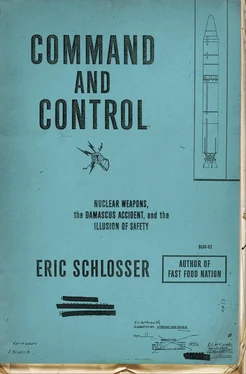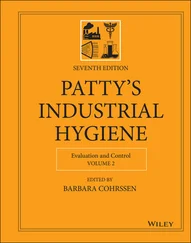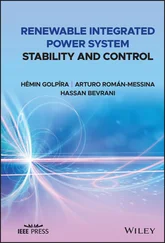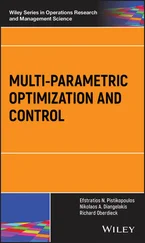Back out, Hanson said, back out.
Livingston and Kennedy left the blast lock, hurried through the two blast doors, and went up the stairs.
Hanson had an idea: maybe they should turn on a ventilation fan to clear out some of the fuel vapor. The switch for the fan was on the wall of the access portal, at the bottom of the first flight of stairs.
Livingston and Kennedy were almost out of the complex when they heard Hanson say, turn on the fan. They looked at each other. Livingston patted himself on the chest, signaling that he would go down and do it.
Kennedy reached the top of the stairs and stepped into the night air. It felt good to be out of there. That cloud of fuel vapor was insane, he’d never seen anything like it. Kennedy was tired. He decided to sit for a moment on the concrete curb outside the access portal. It had been a hell of a night.
Livingston switched on the fan and came back up the stairs. He was a foot or two behind Kennedy when the Titan II exploded.
At the command post in Little Rock, the radio went dead. And the open phone line from the control center at 4–7 became silent. The sound of the tipsies — the intruder alarm that had been ringing ever since the missile crew left — was gone. Nobody at the launch site could be reached on the radio. For the next eight minutes, the command post did not hear a word from anyone in Damascus. Colonel Moser thought the warhead had detonated.
• • •
SID KING AND HIS SALES REP, Tom Phillips, were sitting on the hood of Sheriff Anglin’s squad car, talking with some of the reporters who’d gathered at the access road to the complex, off Highway 65. Nobody seemed worried about the situation. The Air Force had denied there was a serious problem and said everything was under control. But Van Buren County didn’t get a lot of big news stories, and King was willing to hang around a little longer just to see what happened.
A bright white flash lit the sky, and King felt the air around him being sucked toward the missile site. An instant later, a gust blew it back, and a loud sustained roar came from behind the trees, like the sound of a rocket being launched. A column of fire rose hundreds of feet into the air, tall as a skyscraper and towering overhead. The blast briefly turned night into day, pulled the launch complex apart, and lifted the debris into a mushroom cloud. King saw the flames and felt heat on his face and dove to the ground, terrified, as rocks and pieces of concrete began to rain down.
People were screaming, “Get out of here, get out of here,” and a scene that had been calm and quiet a moment earlier became sheer chaos. King and Phillips hid under the taillights of the squad car, trying to avoid falling rocks — and then the taillights came on. Sheriff Anglin was backing out, and he didn’t know they were behind the car. They leaped out of the way as Anglin floored it and pulled onto the road. State officials, highway patrolmen, Air Force officers, cameramen, and reporters were getting into their cars and speeding south toward Damascus. The scene had a primordial feel: every man for himself.
Just a few minutes earlier, Lou Short, the cameraman for Channel 4, had been showing off his brand-new, state-of-the-art, $30,000 RCA video camera. When the debris started to fall, King saw him toss the camera into the back of a truck like an old piece of wood and drive off. None of the news photographers got a picture of the explosion. Getting away from it seemed a lot more important. Larry Ellis, the cameraman for Channel 11, captured the only images of the blast — ten seconds of blurry footage, shot in 16mm, after the eyepiece of his camera was blown off. And ten seconds was long enough for Ellis, who stopped filming, jumped into the truck driven by his reporter, and joined the panicked exodus to Damascus.
King and Phillips headed the other way in the Live Ear , driving north on Highway 65 toward the radio station in Clinton. King had his foot to the floor, praying that his little Dodge Omni could outrun the radioactive fallout and whatever else had been released into the air. They knew the missile had a nuclear warhead, no matter what the Air Force said. But they had no idea if that warhead had detonated. About half a mile up the road, an Air Force security officer stood in the middle of the highway, wearing a gas mask and holding an M-16.
Sheriff Anglin was ahead of them, driving erratically, going ninety miles an hour, slowing down to fifty, and then speeding up again. The cord of Anglin’s police radio had gotten wrapped around his right leg, and every time he lifted the handset to speak into it, the cord pulled his foot off the gas. The sheriff stopped at the truck stop in Bee Branch, about six miles north of Damascus, and told everyone to get out of there, right away. Nobody argued with him. The place emptied, and big eighteen-wheelers peeled onto the highway.
Driving through Choctaw, King realized that neither he, nor Phillips, had spoken since the explosion.
“We just left a bunch of dead people back there,” King said.
“Yeah, I know.”
• • •
SAM HUTTO WAS COMING HOME to milk the cows when the missile blew. He was just north of Damascus, on a stretch of Highway 65 that looked down on the launch complex, about two miles away. The blast rattled his pickup. He saw the bright flash, the flames shooting upward like a Roman candle. And then he saw a little sparkly thing fly out of the fire, soar above it briefly, and fall to the ground. He decided not to milk the cows, turned the pickup around, and drove to his brother’s house. And his father, who was spending the night there, seemed curious about what had just happened
“Hop in here,” Hutto said to his dad, “and let’s go up to the top of the hill so you can see.”
Hutto drove to the top of the hill and saw another incredible sight: the headlights of vehicles speeding toward them, bumper to bumper, filling both lanes of the two-lane highway. It looked like a NASCAR restart. As Hutto and his father sat in the pickup beside the road, a couple of state police cars flew past them, followed by news trucks and all sorts of Air Force vehicles — even an ambulance. Nobody stopped, slowed down, or told them to evacuate. Once the vehicles were gone, the road was empty and still again, like it always was at three in the morning. But a fire was burning brightly in the silo.
• • •
BOB PEURIFOY WAS FAST ASLEEP when he got the call. A Titan II just blew up in Arkansas, Stan Spray told him. There was a lot of confusion about the details — and no word on the warhead. Of course, it hadn’t detonated full scale. If it had, much of Arkansas would be gone. An Accident Response Group was being assembled, and they wanted Peurifoy to be part of it. A plane would soon land at Kirtland Air Force Base to take him and the rest of the group to Little Rock. Peurifoy got out of bed, thinking about that warhead.
• • •
THE DECISION TO EVACUATE the missile site was made by Colonel William Jones, the commander not only of Little Rock Air Force Base but also of its Disaster Response Force. He didn’t have any authority at Launch Complex 374-7 until a disaster occurred. The explosion qualified as one, and Jones briefly conferred with Richard English, the chief of the Disaster Preparedness Division, about what to do. They both thought that everyone at the launch complex was dead and that the air drifting toward Highway 65 was probably full of toxic fumes. Jones knew very little about Titan II missiles and their propellants. He belonged to the Military Airlift Command, which flew transport planes, not the Strategic Air Command.
“Evacuate, evacuate,” English shouted repeatedly, over the loudspeaker of the mobile command post.
Читать дальше












